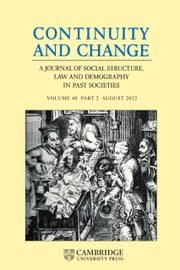Article contents
Balancing, networking and the causes of emigration: early German transatlantic migration in a local perspective, 1700–1754
Published online by Cambridge University Press: 01 December 1998
Abstract
Since the early 1980s, the eighteenth-century beginnings of German mass migration to North America have been the subject of intense research and writing. In spite of the multifaceted results of this research on both sides of the ocean, the textbook explanation of early German Atlantic migration has demonstrated a striking persistence. To quote from one of the best English-language textbooks on German social history, ‘from about 1750 on, over-population fuelled…the beginnings of the exodus to North America’. This interpretation is exactly where scholars such as Wolfgang von Hippel stood more than a decade ago, and it dovetails with the migration theories of German population sociology of the 1970s. But is it right? And what alternative explanations are available? The most important alternative to the received approach is offered by the concept of networks. As Charles Tilly put it, ‘categories stay put, networks move’. If emigrants moved along lines of contacts and information, we do not need to refer to strong push or pull factors in order to explain why they were ‘uprooted’ from the territorial categories to which they belonged. Chain migration can be interpreted as a self-generating and self-sustaining process, a system in itself. In this perspective, migration becomes more and more likely because of flows of information, credit or capital between the areas involved in migration – contacts created by migration cause additional migration.
Information
- Type
- Research Article
- Information
- Copyright
- © 1998 Cambridge University Press
- 7
- Cited by

